University of North Carolina Hospitals has collaborated with the Malawi Ministry of Health to provide clinical service and education at Kamuzu Central Hospital in Lilongwe, Malawi. This collaboration includes work across many disciplines in medicine, however I will be specifically working with faculty and residents from the Department of Anesthesiology to provide training through clinical education, simulation, and quality improvement in perioperative and critical care medicine.
I will work directly with Malawians training to become clinical officers. Upon completion of their training, these individuals are assigned to provide perioperative and anesthetic care in locations throughout the country. Greater than 50% of the population lives under the poverty level. For these communities, medical care must not only be affordable, but culturally acceptable and sustainable with limited resources.
Access to surgical care in Malawi is largely limited by an insufficient number of anesthesia providers. Because there are only 2-3 physician anesthesiologists in the entire country, mid-level providers are heavily relied upon to deliver anesthetic care. In addition to basic perioperative care, there are minimal resources available to care for critically ill patients. I will seek to understand the Malawian clinical trainees and the challenges unique to their communities, and I hope to enable them to better serve their patients.








I expected this trip to resemble a more traditional educational experience, one where I communicated nuances of clinical knowledge and skills with less experienced learners. What I actually found was a system already providing good training to providers who lack the quality support many of us take for granted.
It is difficult to grasp the discordance between the needs of this patient population and the resources available to provide them care in the perioperative setting. Many of the most basic tools and medications we routinely use in the US are scarce or nonexistent in LMIC settings. However, there are many bright, driven individuals among the staff clinical officers who actively engage in improving the quality of care delivered. Our opportunity to impact this community lies in the development of relationships with these local leaders.
One clinical officer described the frustration of finally acquiring some emergency procedure equipment only to have it wander to another location in the hospital when it was needed most. We discussed checklists and protocols we commonly use to maintain organization in anticipation of chaotic events. Our conversation led to simple, organizational solutions that will allow clinicians to perform more effectively with the resources they already have. It is my hope that our continued partnership will empower our Malawian colleagues to develop incremental and sustainable improvement of the care they work so hard to provide.